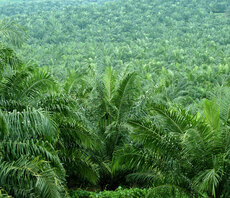Palm oil buyers pledge to fund social and enviornmental projects in ‘priority’ sourcing regions


ASD Impact Fund to pool resources from a range of corporates to support smallholder farmers, landscapes, and communities
A raft of major palm oil buyers have agreed to fund a scheme that aims to generate positive environmental and social outcomes in an undisclosed region where they source the raw material.
The corporate coalition – which includes chemicals company Croda International, consumer goods firm GSK Consumer Healthcare, cosmetics giants Estee Lauder Companies and Natura & Co, and chemicals formulation firms Seppic and Stéarinerie Dubois – announced this morning that it aims to fund a project in a “priority” palm oil region that faces “systemic environmental and human rights challenges”.
All the companies are members of the Action for Sustainable Derivatives (ASD) group, which aims to make palm oil supply chains more environmentally and socially responsible and conducts an annual investigation to map risks in its members’ supply chains.
The new ASD Impact Fund has also been developed in partnership with Tides Foundation and will copy the philanthropic group’s collective action fund model to enable multi-donor collaboration, the update reveals.
The rapid expansion of the palm oil industry to meet demand for food, cosmetics, cleaning products, and biofuel is a major driver of deforestation and degradation of tropical forests in Asia and Central and South America. The resulting land use change, including the clearing of forests, is accelerating both the climate and biodiversity crises; just this week, researchers warned that emissions from tropical forest loss have doubled in the last two decades and continue to increase.
The ASD said it had undertaken an “extensive process” to identify potential projects that would be able to address “underlying issues” that are preventing responsible practices in palm production, noting the funding model developed would enable the six companies to collectively direct resources to those projects.
Edwina McKechnie, associate director at sustainable business organisation BSR, which co-manages the ASD, said the companies behind the ASD Impact Fund wanted to eventually source palm oil that did not drive deforestation.
“We’re proud to launch the ASD Impact Fund. Together, a number of our members are able to pool their resources to fund projects that support our vision for palm derivatives sourcing that is free from deforestation, respects human rights, and supports local livelihoods,” she said. “This first project will ensure resources go into directly supporting smallholders, landscapes and communities linked to ASD’s supply footprint.”
The ASD did not disclose the location or specific aims of the initial project selected by the ASD Impact Fund, nor the amount of funding the corporates aim to provide to it, stating that more details would be announced next month. But it did reveal that it had picked the project after considering a range of variables, including its potential for environmental conservation and restoration, its proximity to priority mills and other landscapes, and its potential to enhance smallholder livelihoods.
Ariane Denis, deputy director of sustainable sourcing at Transitions, said the foundation was pleased to see the ASD take “concrete next steps” to deliver on its mission to transform industry practices for key derivatives.
“The collective impact efforts conducted through ASD will now allow different types of downstream companies, including intermediary players and SMEs, to support on-the-ground actions in strategic palm oil production areas connected to their supply,” she said.
Want to help celebrate and showcase the best of the green economy? You can now enter the BusinessGreen Leaders Awards 2022 and be in with a chance of joining us at the UK’s largest and most prestigious green business awards this summer.













